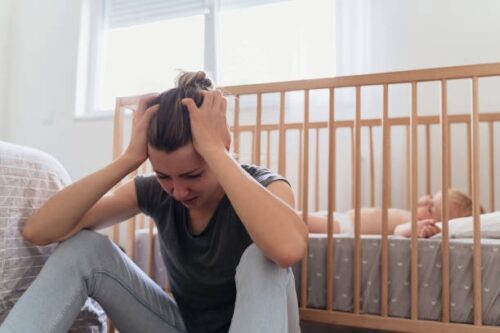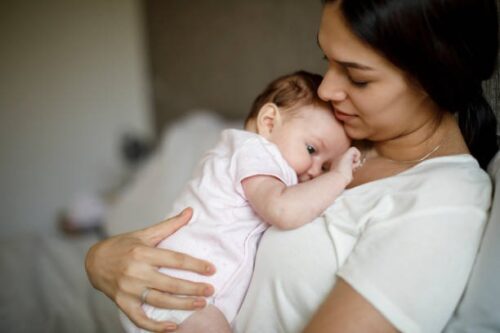I had some reservations about getting pregnant when my hubby and I determined to have kids since I have a reproductive problem—more precisely, obstructed fallopian tubes. I was certain that I wasn’t going to be able to conceive babies as I knew as soon as the issue was diagnosed that I would struggle to become pregnant. However, I was shocked to learn that I had become pregnant without planning. Many things have changed since then. We became incredibly excited, and I began to picture our happiness when my kid finally arrived. I felt like I was eager to meet him, hold him in my arms, care for him, cuddle with him, and kiss him.
However, I was unaware that things sometimes work out differently. Roughly, things took an unexpected turn of events.

Source: pixabay.com
In a way, I see that I was experiencing increased risk factors for postpartum depression at the time my child came into the world. I didn’t have any experience with or handling infants before. I’m not sure exactly how to respond or what to do. I recall wondering, “What am I supposed to do now?” as I looked at him.
Others claim that things will gradually come to you after you’re done giving birth and welcoming your baby. You’ll simply know what’s going on. Regretfully, I didn’t experience that.
I still recall our initial moment with my child alone at the hospital. “He is crying,” I would usually say when I called the nurses in. “I have no idea what to do!”
I felt awful. As a new mother, I was clueless about what to do to properly care for my son. We occupied over an entire week in a medical facility after my kid was born prematurely. We had a lot of duties to accomplish once we returned from the hospital, so my spouse decided to take several weeks away because he wanted to help me. I feared what could happen if I wasn’t able to care for him properly. I questioned if he would be able to have skills in language development if I’d be taking care of him in such a bad mental state.
Despite my husband being at my side, I would consistently have what I refer to as “unfamiliar anxiety” at night for unknown reasons.
Usually, that strange feeling intensifies into unexplainably depressed mood disorders, severe mood swings, and an awful state of mind. I kept this mental struggle to myself since I certainly did not want to seem crazy.
In reality, I was not at all satisfied. I recall believing the situation would improve. Everything would eventually work out, and these emotions would disappear. I had no idea that things weren’t getting better. Things were growing worse. I’m now beginning to wonder about weird things because of major depression and my increasingly serious mental illness and emotional strain causes me baby blues which could be a cause of a family history of depression.
I had the impression that I was trapped in a dream. I wasn’t feeling like myself or like a mother. I used to act cheerful a lot because I thought perhaps I might feel that way eventually. I can’t let anybody else see this new side of me. I do not want them to think negatively of me. My husband and I are unable to discuss it for the reason that we could both get misinterpreted, or he could become confused. When my emotions take over, things will get much more problematic since I would hate everyone closest to me and isolate myself as a result.
So, I have no options.

Source: pixabay.com
Postpartum – Stress In Baby Handling
Taking good care of a baby, working full-time, striving hard to keep the house fairly organized, and squeezing in restful sleep when I could all left me feeling extremely stressed and anxious. I paid no attention to anything around me, not even to my husband. I was very preoccupied with my little one. I was aware of this. I believed I was ready for it.
Everything collapsed at some point. It dawned on me later that my behavior wasn’t typical of me.
Trying to be cheerful when you’re not feeling it and don’t know why I try to hide it. I remember wanting to leave once but needed to figure out where to go.
When my son would cry all the time, I suddenly became irritated and occasionally yelled at him. It doesn’t matter whether he’s a newborn. Whenever I could, I would scream and shout at him to relieve the mental strain. He couldn’t help it, and I am aware that it wasn’t his fault. That was not the kind of mom I wanted to be like!
I used to cry when I was sad, often for a few days at a time or for no apparent reason at all. I couldn’t make it to the office because, regardless of how hard I tried my hardest, once I started crying, there would be no putting an end to it. My crying was that bad.
The Diagnosis
To schedule an appointment, I ultimately had to call my doctor. Although I knew very little about postpartum depression, I began to suspect that I was suffering from it. Upon visiting my physician, I completed an assessment form to treat postpartum depression.
It dawned on me that I had been deceitful on the previous page because I had put all those sentiments away and believed I would soon feel better. I had to force myself to say what was happening this time.
After receiving a postpartum depression diagnosis during my previous pregnancy, I began taking antidepressants. I was crying so much trouble sleeping so much that I could not work despite taking the meds. It took me approximately three months to get it under control, so I had to take a leave of absence from work for that period.
Overall, I would still occasionally feel like I wasn’t quite myself, and my health care providers needed to increase the prescription dosage several times due to this.
I was also recommended to attend an appointment with a therapy counselor by a health care provider and medical professional. When I initially visited the counselor, he advised me to ask for support because I was taking on too much. I decided to continue to think he was wrong, even if I strangely believed he was correct. I think I can manage on my own and don’t believe I need assistance. The therapist went on to say that individuals suffering from untreated postpartum depression tend to either do nothing at all or be a “push it” person.
That’s where I knew I was the go, go, go, person.
It wasn’t until I spoke with a psychotherapist that I understood that my cleaning habit was compulsive and that it was perfectly acceptable to occasionally skip doing the dishes. I have since established a list of chores that I attempt to complete daily to avoid becoming overly stressed and possibly experiencing postpartum psychosis the following day.
The therapist also pointed out that I needed to set aside time for myself and encouraged me to take steps to make sure I did so each night. I felt that doing this would help me be the most compassionate mother I can be for my baby, providing my child with everything he requires.
The mental health professional pointed out that it is hardly self-care to simply retire to bed once my son has fallen asleep. In addition to finding stuff I enjoy doing, I had to dedicate time to my family members and husband as well.
Because I am so preoccupied with looking after my little one, it was difficult for me to come up with ideas for activities I would enjoy doing. Additionally, since we can care for the baby at the same time, both my husband and I have the opportunity to spend a lot of time together. Thus, I didn’t give that counsel any thought. Nevertheless, I received a few recommendations on this and opinions concerning what to do if I feel overly overwhelmed or if I suddenly get angry or upset.
The therapist’s recommendations have all been very beneficial to me. Finding out what I enjoy doing, what seems to work and what doesn’t for me, and what is most important to my spouse and me has required a lot of introspection and soul-searching on my part. I’ve discovered that I appreciate activities that I was not particularly eager to engage in before having a child.

Source: pixabay.com
Better Times To Come
I believe that I am in an extremely positive position now that I have been, despite having to experience postpartum depression for about nine months. I genuinely feel at ease and like myself again. In addition, I think my relationship with my son is now pure. Perhaps all of my experience has improved me as a person compared to before I ever had a child.
Sadly, postpartum depression and bipolar disorder is stigmatized and should not be spoken in such a private manner. I wish mothers who are experiencing mental health issues, like myself, could share their stories with others and work together to find solutions.
I want individuals to know that reaching out to others won’t make them feel alone, unloved, or shamed. They will recover, and assistance is available. I really think that my early postpartum checkup for symptoms of postpartum depression was intended for me in order to support and raise awareness of this mental health issue. So, to all other moms out there, don’t let your mental and emotional health strain you, and this can be discussed with other moms out there via support groups.
Our mental well-being and postpartum depression symptoms are important and deserve to be talked about through talk therapy, or any form of therapy that our mental health provider tells us.